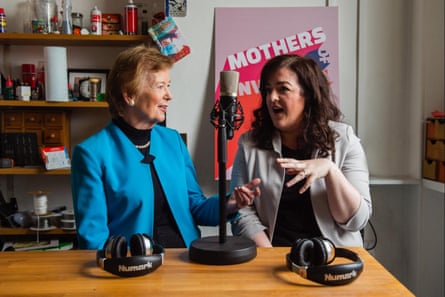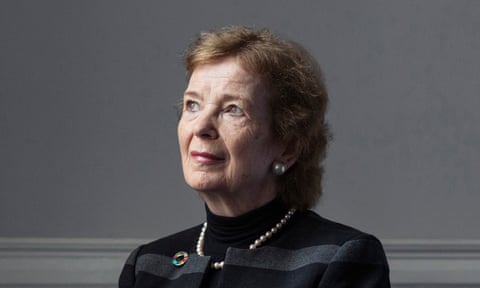On the morning that the world’s leading climate scientists warn that the planet has until 2030 to avert a global warming catastrophe, Mary Robinson appears suitably sombre. She wears black shoes, black trousers and a black sweater and perches at the end of a long table at her climate justice foundation, headquartered in an austere, imposing Georgian building opposite Trinity College Dublin. The only dash of brightness is a multicoloured brooch on her lapel. “It symbolises the sustainable development goals,” she says. “It’s the one good emblem that the United Nations has produced, so I like to wear it.”
There seems little reason for cheer on this Monday. The landmark report by the UN Intergovernmental Panel on Climate Change (IPCC) has just warned that urgent, unprecedented changes are needed to keep global warming to a maximum of 1.5C; even half a degree beyond this will significantly worsen the risks of drought, floods, extreme heat and poverty for hundreds of millions of people. Donald Trump, rejecter of the Paris climate agreement, is riding high on the back of Brett Kavanaugh’s elevation to the US supreme court. Britain and the EU are consumed by Brexit. Brazil is on course to elect a president who wants to open the Amazon to agribusiness. Closer to home, the Irish government is flunking its climate policy goals. Now, climate scientists warn that the clock ticks ever closer to midnight.
“Governments are not responding at all adequately to the stark reality that the IPCC is pointing to: that we have about 11 years to make really significant change,” says Robinson, sitting ramrod straight, all business. “This report is extraordinarily important, because it’s telling us that 2 degrees is not safe. It’s beyond safe. Therefore, we have to work much, much harder to stay at 1.5 degrees. I’ve seen what 1 degree is doing in more vulnerable countries ... villages are having to move, there’s slippage, there’s seawater incursion.”
Robinson sips a glass of water and sighs. “We’re in a bumpy time. We’re in a bad political cycle, particularly because the United States is not only not giving leadership, but is being disruptive of multilateralism and is encouraging populism in other countries.”
This could be the start of a depressing interview that concludes we should hitch a ride on Virgin Galactic’s first trip to space and try to stay there. But it turns out to be surprisingly upbeat. Despite the headlines, Robinson, who served as the UN secretary general’s special envoy on climate change after serving as the president of Ireland and the UN high commissioner for human rights, is hopeful.
She has anticipated the IPCC report by writing a book-cum-manifesto, Climate Justice: Hope, Resilience and the Fight for a Sustainable Future, published this week. It tells stories of farmers and activists, mostly women, who tackle climate change in Africa, Asia and the Americas. They are examples of positive change that Robinson thinks can help turn the tide.
“I don’t think as a human race that we can be so stupid that we can’t face an existential threat together and find a common humanity and solidarity to respond to it. Because we do have the capacity and the means to do it – if we have the political will.”
Climate change may be man-made, but Robinson believes women are key to the solution, through planting trees, recycling waste, eating less meat and a thousand other measures, big and small. “There’s a nurturing quality, a concern for children, that’s very deep in women. And women change behaviour. It’s women who decide what the diet will be. And, of course, in vulnerable countries, it’s women who bear the brunt of climate change.”
The former barrister karate-chops the air for emphasis. “I’ve learned from Archbishop Desmond Tutu to be a ‘prisoner of hope’, a great expression that he uses. That means the glass may not be half full, but there’s something in the glass that you work on. Hope brings energy.”

So, while the Trump administration withholds leadership and money from the global effort for clean energy – “That’s where it hurts” – the US may yet meet Paris emissions targets, thanks to efforts by We Are Still In, a coalition of mayors, governors, tribal leaders, colleges, businesses, faith groups and investors that is continuing to follow the terms of the agreement. The movement to divestment from fossil fuels is also making progress. “They’ve now moved to trillions being divested. That’s very significant.”
Grim scientific prognoses must not paralyse civil society, says Robinson. It must unite, march, organise, pressure politicians. “Feeling a complete inability to do anything – ‘This is too big for me, I give up’ – that’s no use to anybody. [With] despair, all the energy to do something goes out of the room.”
Robinson says she is adapting her own behaviour: fewer flights and more teleconferencing; eating less meat as an “aspirant vegetarian”; using public transport, although she confesses to taking taxis frequently. “I talk to the taxi drivers, that’s my compensation. I get them to message for me. Ten years ago, taxi drivers were the most sceptical about climate change. Now, they’re the most keen to get an electric car, or at least a hybrid.”
At the age of 73, Robinson has carved out a new role in public life. No longer a high-powered global bureaucrat with a big budget and staff, no longer a head of state trailed by pomp, she instead relies on a formidable intellect, her brand name and her social and political network. You could call it soft power, except Robinson does not do soft. She is friendly and courteous, but the famous iron-grip handshake is still there; so too her antiphathy towards smalltalk. The gaze is direct, the sentences exact. When I go off-topic and ask about Brexit, or the Irish presidential election, there is a tight smile. “We’re straying far from the book, aren’t we?”
Supporters and critics have long noted a personal stiffness matched by an unbending commitment to liberal principles. How else would a GP’s daughter from Ballina, County Mayo, emerge in the 1970s as a law professor and outspoken advocate for women’s rights and contraception while other politicians genuflected before the might of the country’s Roman Catholic church? She was denounced from the pulpit and had condoms sent to her in the post. Nominated by the Labour party as a long-shot candidate for the presidency in 1990, she won. It was an astonishing result that prefigured Ireland’s social liberalisation. It enshrined Robinson as a progressive talisman.
Kofi Annan tapped her up to become the UN’s high commissioner for human rights in 1997, three months before her presidential term ended. It was a rare misstep. She has expressed regret for letting the then secretary general “sort of bully” her into leaving the presidency early to head to Geneva. Later, George W Bush’s administration bristled at her stance on human rights, Palestine and other issues after 9/11, which contributed to her stepping down in 2002.
A year later, Robinson found herself in a Dublin maternity ward holding her first grandchild, Rory. “I was flooded with a sense of adrenaline, a physical sensation unlike anything I had ever felt before,” she writes in Climate Justice. “In that moment, my sense of time altered and I began to think in a time span of a hundred years. I knew instinctively that I would now view Rory’s life through the prism of our planet’s precarious future ... the abstract data on climate change that I had skirted around for so long became deeply personal.”
Robinson was struck by the injustice that those least responsible, such as islanders in Kiribati or herders in Kenya, suffered most from climate change, and by the fact that much of the world ignored scientists’ warnings. Her response is to tell the stories of people such as Sharon Hanshaw, a hairdresser in Mississippi who led community recovery efforts after Hurricane Katrina; Constance Okollet, a Ugandan farmer who taught neighbours to plant trees to stop topsoil erosion; and Natalie Isaacs, an Australian entrepreneur who launched an online initiative to help households curb their carbon footprints. “I try to illustrate the hope and the fightback,” says Robinson. “And the need for empathy. We need to have empathy now with those who are suffering ... because that’s where we’ll all be very shortly if we don’t change course.”
Robinson wanted to do a documentary to accompany the book, but she was advised instead to do a podcast. “Being of my generation, I said: ‘What’s a podcast?’” she laughs. She agreed. Thus was born an unlikely phenomenon: Mary Robinson, comedian. The former president co-hosts the podcast Mothers of Invention with Maeve Higgins, an Irish comedian based in New York. They banter while discussing climate change and interviewing guests. “People listen through Maeve, through her questions. It’s making it much more real. There’s no doubt that Maeve is drawing me to the dark side. I’m getting funnier because of that.” Higgins does the comedic heavy lifting, riffing and throwing out lines while Robinson plays the straight foil.
“I’ve learned that young people now in the United States get their politics from comical programmes,” says Robinson. She alludes to The Daily Show, but mixes up Jon Stewart with Jimmy Stewart and Trevor Noah with Trevor Nunn, which is actually pretty funny.

Robinson considers comedy a sensible response to existential threat. “Laughter in a very serious discussion is much more persuasive than if we were all the time serious, serious, serious.” I consider asking her to tell a joke, but my nerve fails; back to business. “We have 11 years to change course and it has to be done with a seriousness of purpose, particularly by governments, because they determine the rules.”
Preparations for a conference in Poland in December to ensure implementation of the Paris agreement are not going well, she says: “There’s a lot of arguing around what needs to be done.” She hopes the IPCC report will focus minds. “Future governments won’t be able to do what governments now have 11 years to do. In the future, we will have these tipping points – the Arctic will be gone, the coral reefs will be gone, the permafrost will be dissolving ... all these things will just spin us out of control.”
Governments need to end fossil fuel subsidies and increase tax on carbon, she says. “Put a real price on carbon and do it now. These are the levers that move things quickly and get the investment into clean energy. If governments are not capable of being more serious, then they lack moral leadership, which is what we really need now.”
Leaving aside the rest of the world, the country outside Robinson’s door challenges her optimism. When Irish civil society marches these days, it is for housing, not climate change. The government hinted that it would increase carbon tax in this week’s budget, but it did not. Climate change has barely registered in the presidential election. Robinson seems unabashed. “In my experience, human rights has always been a struggle. We don’t always keep going forward; there are setbacks and then you dig deeper. You get the prisoner-of-hope mentality and you fight harder.”
Climate Justice: Hope, Resilience and the Fight for a Sustainable Future is out now (Bloomsbury, £16.99). To order a copy for £12.49, go to guardianbookshop.com or call 0330 333 6846. Free UK P&P over £10, online orders only. Phone orders minimum P&P of £1.99.
This article was amended on 12 October 2018 to correct the caption accompanying the picture of Mary Robinson in East Jerusalem. She was visiting the area with the NGO The Elders, not as the UN high commissioner for human rights.
